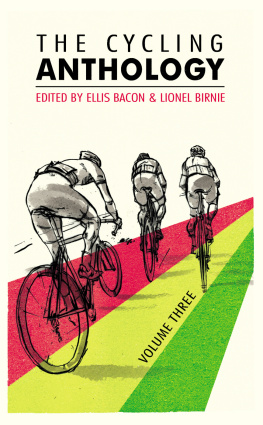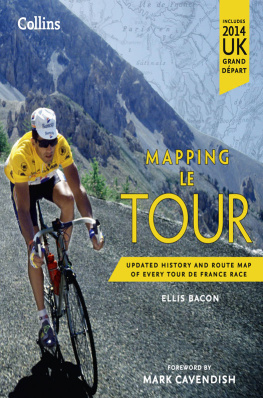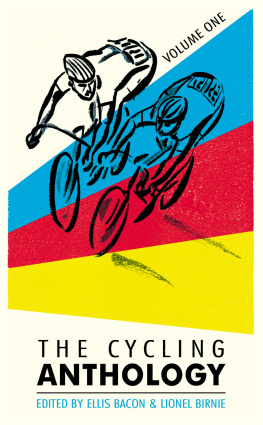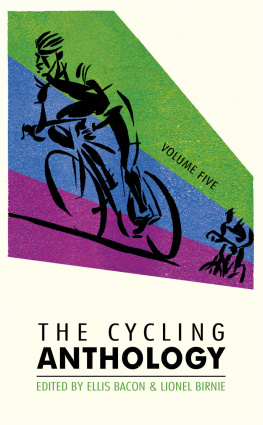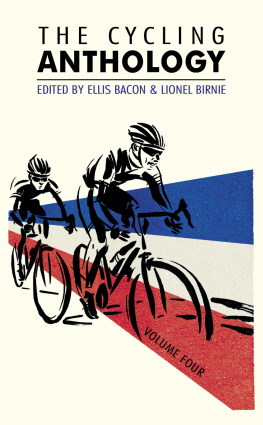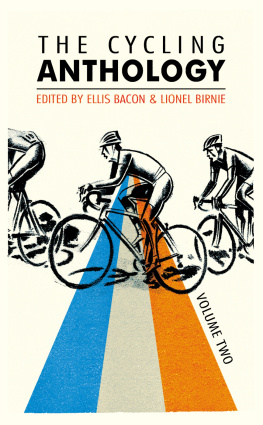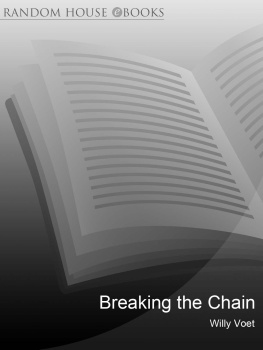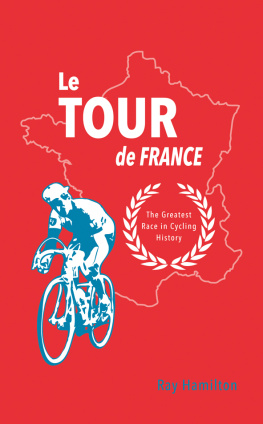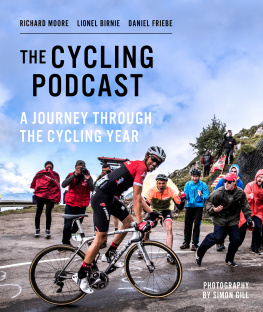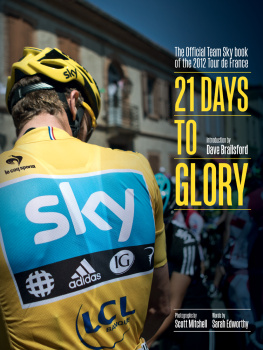CONTENTS
THE NEUTRALISED ZONE
INTRODUCTION BY THE EDITORS
THE CURIOUS CASE OF THE GARMIN THREE
BY NEAL ROGERS
THE INDIVISIBLE MAN
BY NED BOULTING
TWO-BOB ROCKETS
BY KENNY PRYDE
ON THE BUSES
BY RUPERT GUINNESS
NINETEEN EIGHTY-FOUR
BY RICHARD MOORE
THE ONES WHO (ALMOST) GOT AWAY
BY ANTHONY TAN
DIFFERENT TIMES
BY SAMUEL ABT
ISLAND MENTALITY
BY OWEN SLOT
OUT OF NOWHERE
BY KLAUS BELLON GAITN
WHAT MAKES A GREAT RACE?
BY EDWARD PICKERING
YOU ARE THE PRO
BY ELLIS BACON
GLASS HALF EMPTY
BY JEREMY WHITTLE
THE TOUR OF BRITAIN AT TEN
BY LIONEL BIRNIE
About the Book
Professional cycling is a rich, dynamic and often controversial sport that lends itself to great writing. Some of the most famous and illustrious races were founded by newspapermen and The Cycling Anthology continues this tradition by bringing together the best in the business.
Volume Three features original and exclusive pieces by leading cycling writers. Ned Boulting goes behind the scenes at the 2013 Tour de France to get to know the second British winner in two years, Chris Froome; Richard Moore tells the story of Marianne Martin, winner of the first women's Tour de France; Lionel Birnie recounts the story of the Tour of Britian through the prism of the 2013 edition; Jeremy Whittle assess how the aftermath of Lance Armstrong's sensational confession affected Team Sky; and many more.
Between them, theyve covered hundreds of Tours de France and written dozens of excellent books and some have even ridden the Tour. Here, their work is showcased together.
About the Authors
Lionel Birnie is a journalist, author and publisher who specialises in cycling. He is the freelance cycling correspondent for The Sunday Times and writes for Cycle Sport and Cycling Weekly, two of Britains leading cycling magazines.
Ellis Bacon is one of Britains most experienced cycling journalists. He is the former deputy editor of Procycling magazine, and has written extensively for Cycling Weekly and Cycle Sport.

This ebook is copyright material and must not be copied, reproduced, transferred, distributed, leased, licensed or publicly performed or used in any way except as specifically permitted in writing by the publishers, as allowed under the terms and conditions under which it was purchased or as strictly permitted by applicable copyright law. Any unauthorized distribution or use of this text may be a direct infringement of the authors and publishers rights and those responsible may be liable in law accordingly.
Version 1.0
Epub ISBN 9781448191666
www.randomhouse.co.uk
Published by Yellow Jersey Press 2014
2 4 6 8 10 9 7 5 3 1
Copyright Peloton Publishing 2013
Each author has asserted their right under the Copyright, Designs and Patents Act 1988 to be identified as the author of their work
First published in Great Britain in 2013 by Peloton Publishing
Yellow Jersey Press
Random House, 20 Vauxhall Bridge Road,
London SW1V 2SA
www.vintage-books.co.uk
Addresses for companies within The Random House Group Limited can be found at: www.randomhouse.co.uk/offices.htm
The Random House Group Limited Reg. No. 954009
A CIP catalogue record for this book is available from the British Library
ISBN 9780224092456
THE NEUTRALISED ZONE
INTRODUCTION BY THE EDITORS
WELCOME TO THE third volume of The Cycling Anthology, which marks a successful first year for our co-operative project, showcasing the work of some of the best cycling writers.
Following our Tour de France special edition, this volume looks back at the 2013 season.
Inevitably, the fall-out from Lance Armstrongs admission to Oprah Winfrey that he had doped throughout his seven-year reign at the Tour de France cast a deep shadow over professional cycling in 2013.
While the sport wrestled with the consequences of Armstrongs confession, there was nevertheless much to enjoy.
Our thanks to all of our contributors for their continued support for The Cycling Anthology. Our very special thanks go to all our readers. We hope you enjoy this latest collection of original writing.
Ellis Bacon & Lionel Birnie
David Zabriskie, Tom Danielson and Christian Vande Velde finally admitted to the public that they had doped in the wake of the USADA investigation.
All three had privately confessed years earlier, had been repentant and were following a clean road, yet they faced a rocky reception when they returned to racing.
asks whether they deserved to be treated more leniently than riders who are caught red-handed, serve their ban and return as if nothing had happened.
THE CURIOUS CASE OF THE GARMIN THREE
BY NEAL ROGERS
WHEN THE UNITED States Anti-Doping Agency released its reasoned decision on October 10th, 2012 a 1,000-page dossier of evidence proving widespread, systematic doping by Lance Armstrong, Johan Bruyneel, Michele Ferrari and a dozen former US Postal Service team riders reaction ran across the spectrum of emotion.
Armstrong loyalists, awed by his unprecedented seven consecutive Tour de France victories, enthralled by his role in the cancer community, or starstruck by his celebrity status, were angry, and crestfallen.
American cycling fans, who had long revered former US national champions such as George Hincapie and Levi Leipheimer, expressed shock, disappointment, and sadness.
The doping problem, which American fans had long viewed as a cultural issue within the European peloton, could no longer be viewed as an overseas phenomenon.
If the past indiscretions of Tyler Hamilton and Floyd Landis had not been enough, there was no denying the depth of deceit that had been part of American cycling, extending over a decade. The best Americans of their generations werent just cheaters, they were the best cheaters in a peloton that had been, for over 20 years, devoid of a moral compass. The Americans had gone to Europe, discovered doping, and perfected the art; Armstrong had benefitted more than anyone.
And while Armstrong, Hamilton, Landis, Hincapie and Leipheimer would never again compete after the USADA report was released, that wasnt the case for The Garmin Three: a trio of active riders Christian Vande Velde, David Zabriskie and Tom Danielson who seemingly fell into a category of their own.
Between them were Grand Tour stage wins, week-long stage race titles and national championships. As the USADA report proved, and their scripted, simultaneously-released confessional apologies confirmed, all three riders had cheated for years, and reaped the benefits. This was not in question.
But all three had done something the majority of their peers had not; theyd changed their ways, willingly, well before being exposed, well before a federal investigation had been launched, well before the pro peloton began to collectively recognise that it had been poisoning itself its viability, its future from within, one injection, one blood transfusion at a time.
Beginning in the summer of 2007, under the leadership of team manager Jonathan Vaughters also a former US Postal rider, and who also admitted to doping Vande Velde, Zabriskie and Danielson agreed to leave behind both their respective teams and their sinful pasts.
For the 2008 season and beyond, they accepted the option that they would likely face defeat, on the playing field, for victory of another sense: the kind that enables one to sleep easier at night, knowing that theyd done the right thing if not initially, then while they still had the chance to do it on their own terms.
Next page
